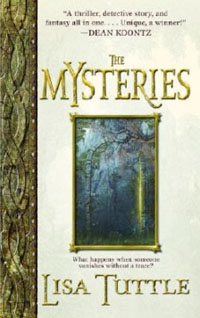You wouldn’t think I’d like Lisa Tuttle’s The Mysteries. It’s a contemporary-set fantasy novel, using Celtic mythology, written by an American and set in Britain. Any of those things would put me off, but in fact The Mysteries is brilliant and gets away with all of it. I read it because I’ve been reading Tuttle for years and even when I do not enjoy her books I always think she’s amazing. She’s written books I’ll probably never read again because they’re too disturbing, but I’ll buy anything she writes as soon as I can, even in genres I don’t like.
The Mysteries gets away with so much because Tuttle has a deep understanding of Celtic mythology and not a typically shallow one, because while she’s American she’s been living in Britain for decades, and because even so she knows enough to make her first person narrator an Anglicized American. This is a book that only Tuttle could have written—and it’s surprising how rare it is to say that, to read something that could only have been written by that writer. A lot of books are fun but they could have been written by anyone.
The book begins with a dictionary definition of “mystery” in all its senses, and then immediately plunges into the world of mysterious disappearances. Ian Kennedy is a private detective who tries to find missing people. A lot of people have gone missing in his life, and we slowly learn what happens when he finds them. There are four stories of disappearances connected to Ian, in addition to the accounts of historical mysterious disappearances that the book is dotted with. There’s his father, Jim, his girlfriend, Jenny, his first case, Amy, and his current case, Peri. Two of them were perfectly ordinary disappearances, people who wanted to vanish and did. Two of them went into the Otherworld. The book circles on itself; reading it is following several stories at once, and if there’s a central meaning to “mystery,” it’s close to “Eleusinian”.
Most retellings of Celtic myths annoy me because no matter how they do things they get the feel wrong. I’m not saying this because I don’t want my culture appropriated—goodness knows it’s a bit late for that. It just grates on me. There’s also the way that they are as stories very closely tied to place, though not so much time. When they’re displaced, they lose a lot of what’s important to me. It’s often possible to go to the very spot where these things are supposed to have happened. Tuttle doesn’t displace her stories, they take place in real places in Scotland, and not cliche places either. And she gets the feel exactly right, the fuzziness and the unexpected solidity of Celtic mythology, the toys that turn into Guardians, the way fairyland is simultaneously hyper-attractive and unattractive. This book is set in very real places and just across the borderlands of faerie, and it never puts a foot wrong.
I’m reluctant to talk about the plot, so let’s talk about the characters. They’re very memorable. There’s Ian, with his empty life and his compulsion to find people who have disappeared. There’s Fred, who desperately wants to get into the Otherworld that she was afraid to enter when she was a child. There’s Laura, who wants to find her daughter and can’t believe what has happened to her, and Hugh, the arrogant mortal man who loses his girlfriend to a sidhelord in three games of Go in a nightclub. There’s the story of Etain and Midir, there are other bits of mythology and fairytale, there are people who have spent time inside the hill, and people who can’t believe it, and people who are always on the outside looking in.
This is a curiously compelling read. I know that nothing I’ve said about it makes it sound like something you won’t be able to put down, but really this is the case. It’s a quiet little book about the Otherworld in the real world, it’s a set of investigations of people who disappear, but it definitely has the “I-Want-To-Read-It” nature. It’s probably because Tuttle really is such an incredibly good writer.
Jo Walton is a science fiction and fantasy writer. She’s published eight novels, most recently Half a Crown and Lifelode, and two poetry collections. She reads a lot, and blogs about it here regularly. She comes from Wales but lives in Montreal where the food and books are more varied.










